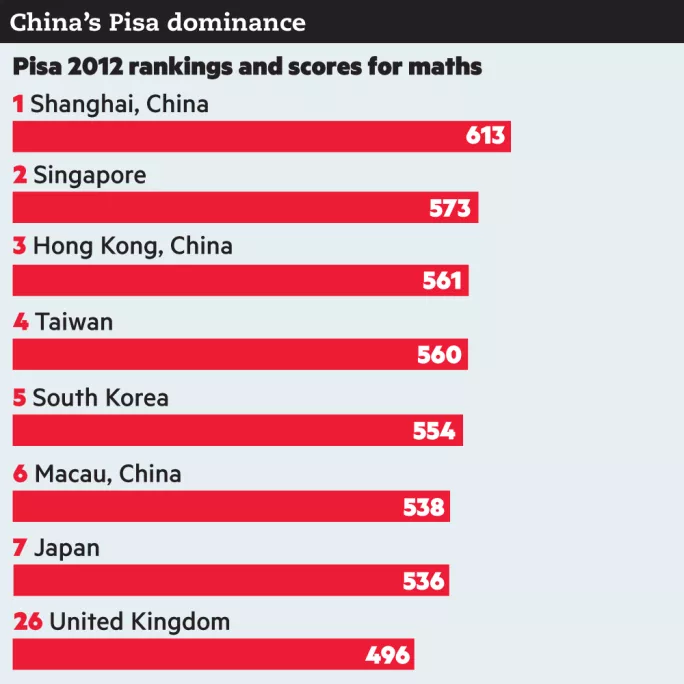Shanghai exits Pisa table but top spot’s still within grasp

Shanghai is set to be absorbed into an overall Pisa score for China, which will combine the city’s score with three other high-performing regions.
However, the country’s score will still not include results from all parts of its schools system when the new Pisa tables are published on 6 December.
The powerhouse city has dominated the Programme for International Student Assessment (Pisa) ever since it first entered in 2009, always finishing way above all other schools systems in maths, reading and science. However, any relief from Shanghai’s rivals would be premature.
Provinces come together
The latest Pisa will also include three other provinces from mainland China for the first time - Beijing, Jiangsu and Guangdong. Academics have told TES that there is no reason to expect that their performance will be anything less than impressive in the Pisa tests.
Professor Yong Zhao, an expert in Chinese education from the University of Oregon in the US, said: “Jiangsu and Guangdong - they are pretty good provinces and won’t necessarily show much of a deviation from what China [Shanghai] has done before - especially Jiangsu. I think it is the same for Beijing.”
The prospect of more Chinese school systems entering the league tables is enough to give education ministers across the rest of the world palpitations, as they sweat over their ranking positions. In the last Pisa, from 2012, the Shanghai region was ranked first and a city state, two cities and another country, all with majority Chinese populations, took four of the next five positions (see box, above), including Singapore, Hong Kong, Taiwan and Macau.
There is one saving grace for rivals trailing in their wake: the Organisation for Economic Cooperation and Development (OECD), which runs Pisa, has told TES that results from the three new Chinese provinces will be put together with Shanghai to produce a single joint Pisa score for mainland China.
There should be no suggestion that their performance as “China (People’s Republic)” in Pisa next month, represents the country as a whole. In that sense, China remains a special -and potentially distorting - case.
Shanghai’s stellar Pisa performance has led the UK government to do its best to emulate the city’s schools. But if the UK also chose to only enter schools from its highest-performing, most prosperous areas into Pisa, that in itself could go some way towards closing the gap with Shanghai.

Terms of entry
When it comes to deciding the terms of its entry to international surveys, China appears to be uniquely able to call the shots.
Christian Bokhove, a Southampton University maths education academic who has studied Pisa and its rival Trends in International Mathematics and Science Study (Timss), said: “They have to make do with what countries want to do for them. If you want some data from China and China only wants Shanghai to participate…then you either have to say ‘no’ or you make do with what you have. They have obviously said ‘yes’ to this.”
Pisa’s experience with China does not seem to have put off the International Association for the Evaluation of Educational Achievement, which runs Timss. But it, too, does not expect to be able to get all of China on board.
“We are working to get some of the provinces of China for our next Timss and Pirls [Progress in International Reading Literacy],” Michael Martin, the association’s joint executive director, told TES this month. “It’s up to the countries to join. We can’t make them.”
Timss and Pirls will be held in 2019 and 2016 respectively. Like Professor Zhao, Dr Bokhove expects the addition of extra provinces to do little to damage China’s standing in international education.
‘I think China will still be high in the tables. But they will not be representative as it is in most countries’
“I think they will still be high [in the tables], to be honest,” he said. “But they will not be representative as it is in most countries. [South] Korea and Japan are more representative of Asian countries as a whole.”
According to Professor Zhao, there are “certain places in China that would not do very well” in international education rankings. But he notes: “Overall, even if you put all of China into there, it would still do well compared to other countries like the UK.”
That does not mean that the academic, who was educated in China and has also taught there - believes that such rankings mean that China has a good schools system worth emulating. He puts Shanghai’s success in Pisa down to the fact that Chinese education is good at preparing pupils for taking tests - and that Pisa is a test.
Professor Zhao has written that the West is making a mistake in trying to emulate schools in China because the country “also has the world’s worst education system in terms of its capacity for cultivating creative inventors, innovators and entrepreneurs”.
You need a Tes subscription to read this article
Subscribe now to read this article and get other subscriber-only content:
- Unlimited access to all Tes magazine content
- Exclusive subscriber-only stories
- Award-winning email newsletters
Already a subscriber? Log in
You need a subscription to read this article
Subscribe now to read this article and get other subscriber-only content, including:
- Unlimited access to all Tes magazine content
- Exclusive subscriber-only stories
- Award-winning email newsletters